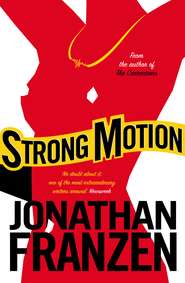По всем вопросам обращайтесь на: info@litportal.ru
(©) 2003-2024.
✖
Freedom
Настройки чтения
Размер шрифта
Высота строк
Поля
“He is being such a little shit,” she told the other mothers during the long winter of the Bedtime Wars, when Joey was asserting his right to stay awake as late as Patty and Walter did.
“Is it tantrums? Is he crying?” the other mothers asked.
“Are you kidding?” Patty said. “I wish he cried. Crying would be normal, and it would also stop.”
“What’s he doing, then?” the mothers asked.
“He’s questioning the basis of our authority. We make him turn the lights out, but his position is that he shouldn’t have to go to sleep until we turn our own lights out, because he’s exactly the same as us. And, I swear to God, it is like clockwork, every fifteen minutes, I swear he’s lying there staring at his alarm clock, every fifteen minutes he calls out, ‘Still awake! I’m still awake!’ In this tone of contempt, or sarcasm, it’s weird. And I’m begging Walter not to take the bait, but, no, it’s a quarter of midnight again, and Walter is standing in the dark in Joey’s room and they’re having another argument about the difference between adults and children, and whether a family is a democracy or a benevolent dictatorship, until finally it’s me who’s having the meltdown, you know, lying there in bed, whimpering, ‘Please stop, please stop.’ ”
Merrie Paulsen wasn’t entertained by Patty’s storytelling. Late in the evening, loading dinner-party dishes into the dishwasher, she remarked to Seth that it was hardly surprising that Joey should be confused about the distinction between children and adults—his own mother seemed to suffer from some confusion about which of the two she was. Had Seth noticed how, in Patty’s stories, the discipline always came from Walter, as if Patty were just some feckless bystander whose job was to be cute?
“I wonder if she’s actually in love with Walter, or not,” Seth mused optimistically, uncorking a final bottle. “Physically, I mean.”
“The subtext is always ‘My son is extraordinary,’ ” Merrie said. “She’s always complaining about the length of his attention span.”
“Well, to be fair,” Seth said, “it’s in the context of his stubbornness. His infinite patience in defying Walter’s authority.”
“Every word she says about him is some kind of backhanded brag.”
“Don’t you ever brag?” Seth teased.
“Probably,” Merrie said, “but at least I have some minimal awareness of how I sound to other people. And my sense of self-worth is not bound up in how extraordinary our kids are.”
“You are the perfect mom,” Seth teased.
“No, that would be Patty,” Merrie said, accepting more wine. “I’m merely very good.”
Things came, Patty complained, too easily to Joey. He was golden-haired and pretty and seemed innately to possess the answers to every test a school could give him, as though multiple-choice sequences of As and Bs and Cs and Ds were encoded in his very DNA. He was uncannily at ease with neighbors five times his age. When his school or his Cub Scout pack forced him to sell candy bars or raffle tickets door to door, he was frank about the “scam” that he was running. He perfected a highly annoying smile of condescension when faced with toys or games that other boys owned but Patty and Walter refused to buy him. To extinguish this smile, his friends insisted on sharing what they had, and so he became a crack video gamer even though his parents didn’t believe in video games; he developed an encyclopedic familiarity with the urban music that his parents were at pains to protect his preteen ears from. He was no older than eleven or twelve when, at the dinner table, according to Patty, he accidentally or deliberately called his father “son.”
“Oh-ho did that not go over well with Walter,” she told the other mothers.
“That’s how the teenagers all talk to each other now,” the mothers said. “It’s a rap thing.”
“That’s what Joey said,” Patty told them. “He said it was just a word and not even a bad word. And of course Walter begged to differ. And I’m sitting there thinking, ‘Wal-ter, Wal-ter, don’t-get into-it, point-less to argue,’ but, no, he has to try to explain how, for example, even though ‘boy’ is not a bad word, you still can’t say it to a grown man, especially not to a black man, but, of course, the whole problem with Joey is he refuses to recognize any distinction between children and grownups, and so it ends with Walter saying there won’t be any dessert for him, which Joey then claims he doesn’t even want, in fact he doesn’t even like dessert very much, and I’m sitting there thinking, ‘Wal-ter, Wal-ter, don’t-get into-it,’ but Walter can’t help it—he has to try to prove to Joey that in fact Joey really loves dessert. But Joey won’t accept any of Walter’s evidence. He’s totally lying through his teeth, of course, but he claims he’s only ever taken seconds of dessert because it’s conventional to, not because he actually likes it, and poor Walter, who can’t stand to be lied to, says, ‘OK, if you don’t like it, then how about a month without dessert?’ and I’m thinking, ‘Oh, Wal-ter, Wal-ter, this-isn’t going-to end-well,’ because Joey’s response is, ‘I will go a year without dessert, I will never eat dessert again, except to be polite at somebody else’s house,’ which, bizarrely enough, is a credible threat—he’s so stubborn he could probably do it. And I’m like, ‘Whoa, guys, time-out, dessert is an important food group, let’s not get carried away here,’ which immediately undercuts Walter’s authority, and since the whole argument has been about his authority, I manage to undo anything positive he’s accomplished.”
The other person who loved Joey inordinately was the Monaghan girl, Connie. She was a grave and silent little person with the disconcerting habit of holding your gaze unblinkingly, as if you had nothing in common. She was an afternoon fixture in Patty’s kitchen, laboring to mold cookie dough into geometrically perfect spheres, taking such pains that the butter liquefied and made the dough glisten darkly. Patty formed eleven balls for every one of Connie’s, and when they came out of the oven Patty never failed to ask Connie’s permission to eat the one “truly outstanding” (smaller, flatter, harder) cookie. Jessica, who was a year older than Connie, seemed content to cede the kitchen to the neighbor girl while she read books or played with her terrariums. Connie posed no kind of threat to somebody as well rounded as Jessica. Connie had no notion of wholeness—was all depth and no breadth. When she was coloring, she got lost in saturating one or two areas with a felt-tip pen, leaving the rest blank and ignoring Patty’s cheerful urgings to try some other colors.
Connie’s intensive focus on Joey was evident early on to every local mother except, seemingly, Patty, perhaps because Patty herself was so focused on him. At Linwood Park, where Patty sometimes organized athletics for the kids, Connie sat by herself on the grass and fashioned clover-flower rings for nobody, letting the minutes stream past her until Joey took his turn at bat or moved the soccer ball down the field and quickened her interest momentarily. She was like an imaginary friend who happened to be visible. Joey, in his precocious self-mastery, seldom found it necessary to be mean to her in front of his friends, and Connie, for her part, whenever it became clear that the boys were going off to be boys, knew enough to fall back and dematerialize without reproach or entreaty. There was always tomorrow. For a long time, there was also always Patty, down on her knees among her vegetables or up on a ladder in a spattered wool shirt, attending to the Sisyphean work of Victorian paint maintenance. If Connie couldn’t be near Joey she could at least be useful to him by keeping his mother company in his absence. “What’s the homework situation?” Patty would ask her from the ladder. “Do you want some help?”
“My mom’s going to help me when she gets home.”
“She’s going to be tired, it’s going to be late. You could surprise her and get it done right now. You want to do that?”
“No, I’ll wait.”
When exactly Connie and Joey started fucking wasn’t known. Seth Paulsen, without evidence, simply to upset people, enjoyed opining that Joey had been eleven and Connie twelve. Seth’s speculation centered on the privacy afforded by a tree fort that Walter had helped Joey build in an ancient crab apple in the vacant lot. By the time Joey finished eighth grade, his name was turning up in the neighbor boys’ replies to strenuously casual parental inquiries about the sexual behavior of their schoolmates, and it later seemed probable that Jessica had been aware of something by the end of that summer—suddenly, without saying why, she became strikingly disdainful of both Connie and her brother. But nobody ever saw them actually hanging out by themselves until the following winter, when the two of them went into business together.
According to Patty, the lesson that Joey had learned from his incessant arguments with Walter was that children were compelled to obey parents because parents had the money. It became yet another example of Joey’s extraordinariness: while the other mothers lamented the sense of entitlement with which their kids demanded cash, Patty did laughing caricatures of Joey’s chagrin at having to beg Walter for funds. Neighbors who hired Joey knew him to be a surprisingly industrious shoveler of snow and raker of leaves, but Patty said that he secretly hated the low wages and felt that shoveling an adult’s driveway put him in an undesirable relation to the adult. The ridiculous moneymaking schemes suggested in Scouting publications—selling magazine subscriptions door to door, learning magic tricks and charging admission to magic shows, acquiring the tools of taxidermy and stuffing your neighbors’ prizewinning walleyes—all similarly reeked either of vassalage (“I am taxidermist to the ruling class”) or, worse, of charity. And so, inevitably, in his quest to liberate himself from Walter, he was drawn to entrepreneurship.
Somebody, maybe even Carol Monaghan herself, was paying Connie’s tuition at a small Catholic academy, St. Catherine’s, where the girls wore uniforms and were forbidden all jewelry except one ring (“simple, all-metal”), one watch (“simple, no jewels”), and two earrings (“simple, all-metal, half-inch maximum in size”). It happened that one of the popular ninth-grade girls at Joey’s own school, Central High, had come home from a family trip to New York City with a cheap watch, widely admired at lunch hour, in whose chewable-looking yellow band a Canal Street vendor had thermo-embedded tiny candy-pink plastic letters spelling out a Pearl Jam lyric, DON’T CALL ME DAUGHTER, at the girl’s request. As Joey himself would later recount in his college-application essays, he had immediately taken the initiative to research the wholesale source of this watch and the price of a thermo-embedding press. He’d invested four hundred dollars of his own savings in equipment, had made Connie a sample plastic band (READY FOR THE PUSH, it said) to flash at St. Catherine’s, and then, employing Connie as a courier, had sold personalized watches to fully a quarter of her schoolmates, at thirty dollars each, before the nuns wised up and amended the dress code to forbid watchbands with embedded text. Which, of course—as Patty told the other mothers—struck Joey as an outrage.
“It’s not an outrage,” Walter told him. “You were benefiting from an artificial restraint of trade. I didn’t notice you complaining about the rules when they were working in your favor.”
“I made an investment. I took a risk.”
“You were exploiting a loophole, and they closed the loophole. Couldn’t you see that coming?”
“Well, why didn’t you warn me?”
“I did warn you.”
“You just warned me I could lose money.”
“Well, and you didn’t even lose money. You just didn’t make as much as you hoped.”
“It’s still money I should have had.”
“Joey, making money is not a right. You’re selling junk those girls don’t really need and some of them probably can’t even afford. That’s why Connie’s school has a dress code—to be fair to everybody.”
“Right—everybody but me.”
From the way Patty reported this conversation, laughing at Joey’s innocent indignation, it was clear to Merrie Paulsen that Patty still had no inkling of what her son was doing with Connie Monaghan. To be sure of it, Merrie probed a little. What did Patty suppose Connie had been getting for her trouble? Was she working on commission?
“Oh, yeah, we told him he had to give her half his profits,” Patty said. “But he would’ve done that anyway. He’s always been protective of her, even though he’s younger.”
“He’s like a brother to her …”
“No, actually,” Patty joked, “he’s a lot nicer to her than that. You can ask Jessica what it’s like to be his sibling.”
“Ha, right, ha ha,” Merrie said.
To Seth, later that day, Merrie reported, “It’s amazing, she truly has no idea.”
“I think it’s a mistake,” Seth said, “to take pleasure in a fellow parent’s ignorance. It’s tempting fate, don’t you think?”
“I’m sorry, it’s just too funny and delicious. You’ll have to do the non-gloating for the two of us and keep our fate at bay.”
“I feel bad for her.”
“Well, forgive me, but I’m finding it hilarious.”
Toward the end of that winter, in Grand Rapids, Walter’s mother collapsed with a pulmonary embolism on the floor of the ladies’ dress shop where she worked. Barrier Street knew Mrs. Berglund from her visits at Christmastime, on the children’s birthdays, and on her own birthday, for which Patty always took her to a local masseuse and plied her with licorice and macadamia nuts and white chocolate, her favorite treats. Merrie Paulsen referred to her, not unkindly, as “Miss Bianca,” after the bespectacled mouse matron in the children’s books by Margery Sharp. She had a crepey, once-pretty face and tremors in her jaw and her hands, one of which had been badly withered by childhood arthritis. She’d been worn out, physically wrecked, Walter said bitterly, by a lifetime of hard labor for his drunk of a dad, at the roadside motel they’d operated near Hibbing, but she was determined to remain independent and look elegant in her widowed years, and so she kept driving her old Chevy Cavalier to the dress shop. At the news of her collapse, Patty and Walter hurried up north, leaving Joey to be supervised by his disdainful older sister. It was soon after the ensuing teen fuckfestival, which Joey conducted in his bedroom in open defiance of Jessica, and which ended only with the sudden death and funeral of Mrs. Berglund, that Patty became a very different kind of neighbor, a much more sarcastic neighbor.
“Oh, Connie, yes,” her tune went now, “such a nice little girl, such a quiet little harmless girl, with such a sterling mom. You know, I hear Carol has a new boyfriend, a real studly man, he’s like half her age. Wouldn’t it be terrible if they moved away now, with everything Carol’s done to brighten our lives? And Connie, wow, I’d sure miss her too. Ha ha. So quiet and nice and grateful.”
Patty was looking a mess, gray-faced, poorly slept, underfed. It had taken her an awfully long time to start looking her age, but now at last Merrie Paulsen had been rewarded in her wait for it to happen.
“Safe to say she’s figured it out,” Merrie said to Seth.
















